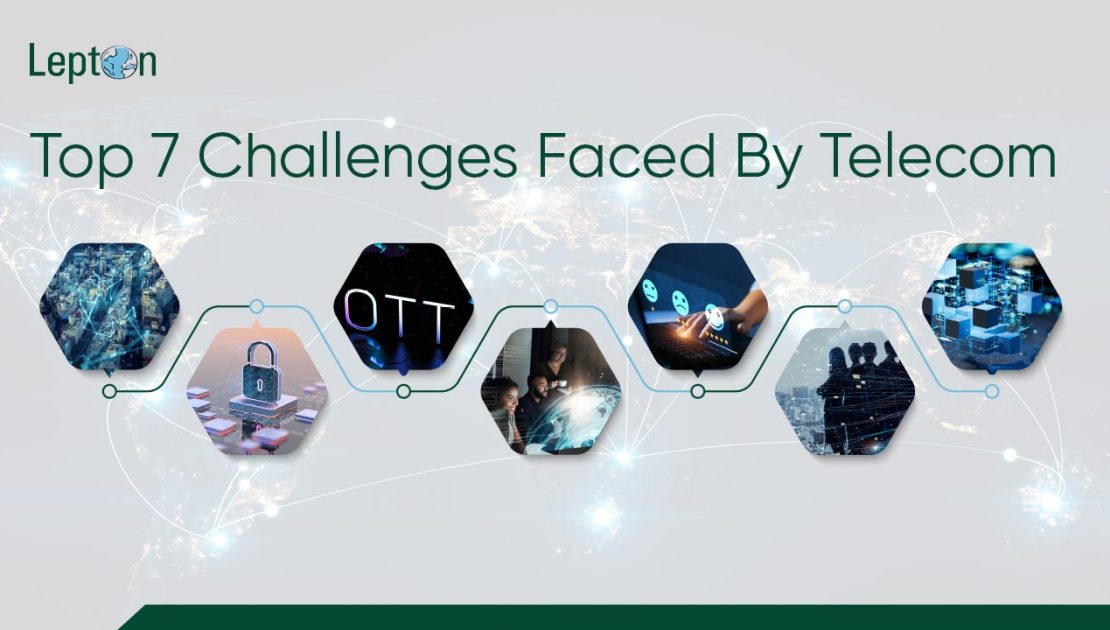As the world solidifies its stance towards becoming a more globally connected place, the responsibility of telcos sees a meteoric rise, too. From finalizing better technologies at play to ensuring a skilled team presence – the checklist is quite extraordinary and is only meant to expand as consumer demand grows. In this write-up, we are going to highlight the all-important challenges that are faced by the telecommunication industry. These challenges are not only limited to operational but in some instances brought up by changes brought by the change in technology, guidelines, and most importantly, sustainability. Let’s dive right in.
Network Congestion and Demand for Bandwidth
Today’s informational exchange rides at a pretty voluminous amount, thus requiring a robust network infrastructure that seamlessly allows connectivity with multiple devices. But as is with the case of keeping peak user experience and network performance intact, the telecom sector faces the uphill task of network congestion which subsequently drives the bandwidth demand. Owing to the lack of it, a network starts facing congestion and poor throughput. Such a situation can also arise through bad configuration of components that are connected to a single network or through poor planning.
The solution to such bottlenecks lies in network monitoring. From diffusing misconfigured traffic to checking the status of the hardware employed, the smart navigation of online traffic with increased bandwidth improves the quality demanded by the users of the framework. This also bodes well in making the network infrastructure to be future-ready too as demand increases with time.
Regulatory Compliance and Data Privacy
To ensure operational integrity, governments worldwide implement principles for fair competition practices, protection of customer data, and adherence to meeting the data quality standards of storage and keeping. The concerns about the ethical usage of user’s data gained more traction with companies trying to one-up their advantage by implementing insights without a consumer’s consent. This also had a snowball effect with users not completely having agency when practicing their online purchasing behavior. With mobile operators having the first access to such sensitive data, it becomes a non-negotiable factor for them to safeguard user information. For instance, in India, TRAI (Telecom Regulatory Authority of India) outlines telco regulations for fair practices, and in Europe, GDPR (General Data Protection Regulation) imposes its management. Failing to comply with said norms, makes a company subjected to legal consequences with heavy fines and in some cases, a complete cease of operations. It’s safe to say that there are no corners to be cut when it comes to rules and regulations. Also, such due diligence is essential in gaining the trust of the customer as it translates into a long-lasting and established base.
OTT Services
The consumption habits of customers have seen a complete shift. With the ascendancy of OTT platforms, users have made it their go-to channel to consume content. Their model which involves hosting diverse content on servers has the network operators in no good stead. With OTT platforms using internet services to make accessibility possible, the telecommunication industry has collectively made its dissent known. Applications that promote over-the-internet calling have severely impacted the mobile operator’s revenue driven by SIM and calling. While the telcos have collectively made a case against OTT players with TRAI, seeking compensation for their infrastructure being used – the core reasoning lies with the rapid advancements that the telecom industry is making by focusing on Fiber/FTTx expansion. With Industry 5.0 and IoT touted as the next big thing, there’s a need for a perfect balance that can sustain the giant strides in work for the telecom stakeholders.
Legacy Systems
One of the core hurdles for telecom players is the quick technological advancement they need to stay relevant in the market. Regular updates require capital investment and most importantly, skilled resources. But the catch always lies in transferring essential information from one tech stack to another. It is here when the pain points of complete digital transformation hit a roadblock. The overnight changes to the entire workflow with migration not only hinders daily operations but also carries a good chance of showcasing integration errors. From a telecom perspective, this can range from legacy systems such as ERPs, CRMs, Hardware, and Network Infrastructure, among others.
While this is one side of the conversation, a dated infrastructure owing to its high cost of maintenance, security issues, integration inadequacy, and lack of sizing up to big-ticket opportunities makes it harder for organizations to carry on. Not to mention, this translates to a loss of revenue and possibly a better place in the market.
Customer Experience and Retention
For every company, it is all about keeping a hold of the current user base and expanding it further. Irrespective of the sector, the said parameter holds the key to an organization’s foreseeable investment – be it from a financial point of view, technological overhaul, or expanding on its groundwork services, having a dedicated customer base gives confidence to stakeholders when releasing new products, features, and services. But, in an economy where new players are making a mark with their bootstrapped offerings, the time calls for constant upgrade and retention policies. This can range from personalized customer experiences, loyalty programs, community build-up, peak service metrics, CSR activities, and more. If an enterprise works on these constructive pillars, they are sure to edge out its competitors, or to put it in today’s vernacular, making them more relevant.
Skills and Resources
On one hand, there’s technology but on the other side, there’s the requirement of understanding, implementing, and utilizing the said platforms. If there’s a bridge between the two aspects, the catchup act begins forcing a particular company to be reactive rather than proactive. This also makes a company less innovative and makes them stuck with archaic usage policies. And, with artificial intelligence and machine learning algorithms taking giant strides, a tandem order needs to be organized which keeps the human workforce equal and in some cases more prominent. So, attracting top talent remains a top priority for the organization, which right now, is posing quite a challenge.
Data Analytics Infrastrucuture
Data analytics have freed companies from the baggage of unprocessed data, making them well-enabled to process data-driven insights for growth. However, as with any mechanism, there are always prerequisite difficulties when the actual process starts. From processing information to its safekeeping, to getting rid of siloes and making information sharing a more collaborative process, analytics require proper harnessing methods for them to be effective.
In the context of the telecom industry, the stakeholders have to keep in mind the unification of various data sources. From avoiding duplication to channel unification, keeping a uniform structure throughout the process builds up the foundation for data analytics usage.
As the telecom sector progresses, a fair share of challenges will be prominent too. But with the right partner, these challenges turn into opportunities. Lepton Software ably understands the dynamics that power up your end-to-end telecom operations. Right from planning to on-ground execution which covers field crew and asset management, Lepton’s telecom suite ably helps your objective take shape. With high-end geospatial intelligence on the offering and well-endowed location intelligence services, Lepton infuses your businesses to be ready for the opportunities. Thus, helping you achieve the perfect balance between scalability, sustainable growth, and revenue generation.

